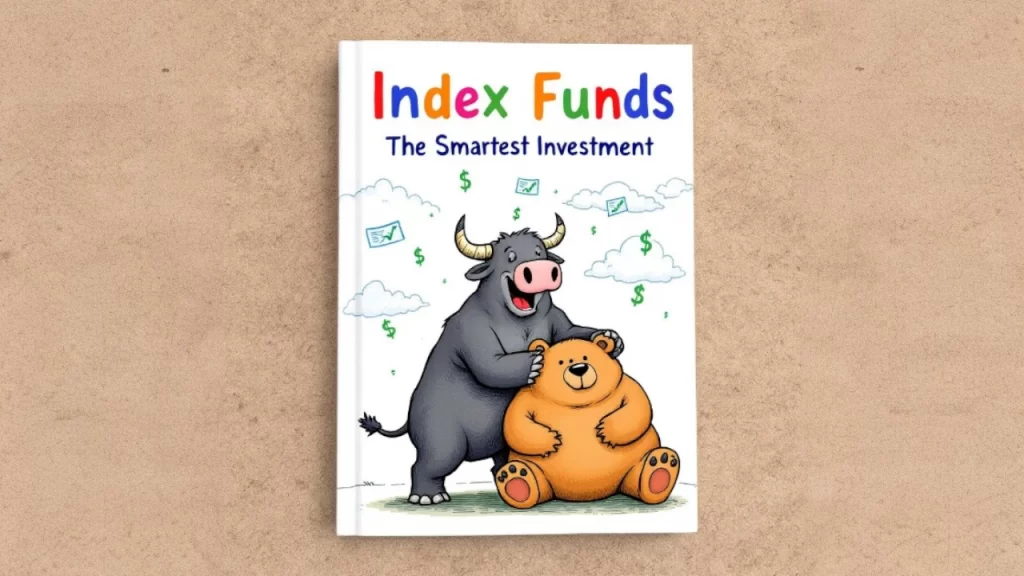Investing can feel overwhelming with endless options—stocks, bonds, mutual funds, and ETFs. But if your goal is long-term wealth without constant stress, index funds stand out as the smartest choice.
Backed by legends like Warren Buffett, index funds offer diversification, low costs, and consistent returns that often outperform actively managed funds. Whether you’re a beginner or a seasoned investor, understanding why index funds dominate long-term investing is key to financial success.
Let’s break down why they’re the ultimate wealth-building tool.
What Are Index Funds?
An index fund is a type of passively managed mutual fund or ETF designed to track a specific market index, like the S&P 500 or Nasdaq. Instead of relying on a fund manager’s stock-picking skills, it mirrors the performance of the index it follows.
How Do Index Funds Work?
- They hold all (or a representative sample) of the securities in the target index.
- Automatically adjust when the index changes (no active trading needed).
- Charge minimal fees since they require little human intervention.
This simplicity makes them a favorite among investors who prefer a “set it and forget it” strategy.
The Power of Passive Investing
Active fund managers try to beat the market—but most fail. Studies show that over 80% of active funds underperform their benchmarks over 10+ years.
Why Passive Investing Wins
✅ Lower Costs – No high fees eating into returns.
✅ Consistent Performance – Matches market growth over time.
✅ Less Risk – Broad diversification reduces volatility.
Passive investing through index funds removes emotion and human error, leading to more reliable long-term gains.
Top Reasons Index Funds Beat Other Investments
Outperformance Over Active Funds
Research from S&P Dow Jones Indices reveals that over 15 years, nearly 90% of active large-cap funds fail to beat the S&P 500. Index funds win by simply matching the market rather than trying to outsmart it.
Lower Fees Mean Higher Returns
- Actively managed funds charge 1-2% annually in fees.
- Index funds cost as little as 0.03% per year.
Even a 1% difference in fees can cost you hundreds of thousands over decades due to compounding.
Built-In Diversification
Instead of betting on a few stocks, index funds spread risk across hundreds or thousands of companies. This reduces the impact of any single stock’s poor performance.
Tax Efficiency
- Less buying/selling = fewer capital gains taxes.
- Ideal for taxable brokerage accounts and retirement funds.
No Need for Market Timing
Even experts struggle to time the market. Index funds let you stay invested through ups and downs, benefiting from long-term growth.
Best Index Funds for Long-Term Investors
Not all index funds are equal. Here are top picks for maximizing returns:
S&P 500 Index Funds
- Tracks 500 largest U.S. companies (Apple, Microsoft, Amazon).
- Historical average return: ~10% annually.
- Examples: Vanguard S&P 500 ETF (VOO), SPDR S&P 500 ETF (SPY).
Total Stock Market Index Funds
- Covers nearly every U.S. stock (small, mid, and large-cap).
- Examples: Vanguard Total Stock Market ETF (VTI), Schwab Total Stock Market Index (SWTSX).
International Index Funds
- Diversifies globally (Europe, Asia, emerging markets).
- Examples: Vanguard Total International Stock ETF (VXUS), iShares MSCI EAFE ETF (EFA).
Bond Index Funds
- Adds stability with lower-risk fixed income.
- Examples: Vanguard Total Bond Market ETF (BND), iShares Core U.S. Aggregate Bond ETF (AGG).
How to Start Investing in Index Funds
Step 1: Choose the Right Brokerage
- Fidelity, Vanguard, Charles Schwab offer commission-free index funds.
- Look for low expense ratios (under 0.10%).
Step 2: Decide on Asset Allocation
- Young investors: 80-100% stocks, 0-20% bonds.
- Near retirement: 60% stocks, 40% bonds.
Step 3: Automate Your Investments
- Set up recurring contributions (weekly/monthly).
- Reinvest dividends for compounding growth.
Step 4: Stay the Course
- Avoid panic-selling during downturns.
- Consistently invest, regardless of market conditions.
Common Myths About Index Funds Debunked
“Index Funds Are Boring”
- Boring = Profitable. Slow, steady growth beats risky speculation.
“You Can’t Beat the Market with Index Funds”
- Most active traders don’t beat the market anyway. Index funds guarantee market-matching returns.
“They’re Only for Beginners”
- Even Warren Buffett recommends index funds for most investors.
FAQs About Index Funds
Are index funds safe?
While no investment is risk-free, index funds are safer than individual stocks due to diversification.
What’s the best index fund for beginners?
Vanguard S&P 500 ETF (VOO) or Fidelity ZERO Total Market Index (FZROX) are great starters.
How much should I invest in index funds?
Aim to invest 15-20% of your income for long-term wealth building.
Can I lose money in index funds?
Yes, during market crashes, but history shows markets always recover and grow.
Should I only invest in index funds?
They should be the core of your portfolio, but you can mix in other assets like real estate or bonds.
Final Thoughts: Start Investing Today
Index funds are the simplest, most effective way to build wealth over time. With low fees, automatic diversification, and reliable returns, they outperform most alternatives without the hassle.
The key is to start early, stay consistent, and let compounding work its magic. Whether you’re saving for retirement or financial freedom, index funds are the smartest long-term investment you can make.
Ready to begin? Open a brokerage account today and invest in your future!
Internal & External Links for Further Reading:
- How to Invest in Stocks Like a Millionaire – The Tips You Need to Know!
- Warren Buffett on Index Funds
- S&P 500 Historical Returns
By following this strategy, you’ll be on the path to long-term financial success—without the stress of stock-picking or market timing. Happy investing! 🚀






